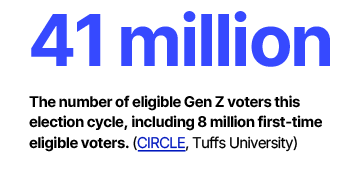- Global (EN)
- Africa (EN)
- Australia (EN)
- Belgium (EN)
- Brasil (PT)
- Canada (EN)
- Canada (FR)
- China (CN)
- France (FR)
- Germany (DE)
- Germany (EN)
- Hong Kong (EN)
- India (EN)
- Indonesia (EN)
- Ireland (EN)
- Italy (IT)
- Italy (EN)
- Japan (JP)
- Korea (KR)
- Latin America (ES)
- Malaysia (EN)
- Middle East (EN)
- Netherlands (EN)
- Spain (ES)
- UK (EN)
- Global (EN)
- Africa (EN)
- Australia (EN)
- Belgium (EN)
- Brasil (PT)
- Canada (EN)
- Canada (FR)
- China (CN)
- France (FR)
- Germany (DE)
- Germany (EN)
- Hong Kong (EN)
- India (EN)
- Indonesia (EN)
- Ireland (EN)
- Italy (IT)
- Italy (EN)
- Japan (JP)
- Korea (KR)
- Latin America (ES)
- Malaysia (EN)
- Middle East (EN)
- Netherlands (EN)
- Spain (ES)
- UK (EN)
Kamala Harris, Brat, and the Future of Elections
with Gen Z
Experts are skeptical about young voters’ political engagement, uncertain that many will show up to the polls this fall for either Vice President Kamala Harris or former President Donald Trump. The numbers are grim, with only 53% of 18–29 year olds “definitely” planning to vote in November, compared to a historical voting average of nearly 70% for Boomers. Most political campaigns will tell you that while younger voters are important, they are unreliable. As a result, campaigns will concentrate energy toward older voters with deeper pockets who are repeat participants.
However, in the days following President Joe Biden’s exit from the presidential race and his endorsement of Vice President Kamala Harris, younger voters have made their presence known. Not only did Harris open up a 20-point advantage among voters 18–34 years old in a head-to-head matchup with former President Trump after launching her Charli XCX Brat styled campaign (Axios/Generation Lab), but Vote.org reported more than 100,000 voter registrations, 84% of those under the age of 34. The early stage of Vice President Harris’ campaign was also marked by historic fundraising: In the first seven days alone, Harris’ campaign raised USD 200 million, with 66% of its contributions coming from first-time donors.
The reaction to Harris’ campaign suggests that despite Gen Z’s stereotype of political apathy, the group will rally for candidates it cares about, influencing donations, public opinion, and potentially votes.
Despite Gen Z’s growing political importance, many hold stereotypes about this generation’s politics that don’t match reality.
MYTH: All Gen Zs are liberal.
REALITY: Only a third of Gen Z identify as Democrats.
While Gen Z tends to lean more liberal compared to past generations, the vast majority are not: 21% identify with Republicans, a notable 29% of Gen Z identifies as Independent, and 16% identify as something else. Gen Z’s political affiliation mirrors a broader increase in independent political affiliation over time, as the public disapproves of the government’s ability to solve problems for everyday Americans.
MYTH: Gen Z votes on style, not substance.
REALITY: Gen Z is driven by issues based in the world they grew up in.
The great recession, the pandemic, school shootings, and social and climate justice movements have all influenced how Gen Z has grown up and see the world—leading Gen Z to have a visceral need for safety and security. Their policy priorities mirror this drive, with Gen Zers increasingly concerned about the cost of food, gas and services, climate change, and gun safety.
MYTH: Gen Z is politically apathetic.
REALITY: Gen Z will take action when they feel their politics are threatened—and it’s contagious.
While Gen Z is stereotyped as a politically apathetic generation, they are far from passive. When their beliefs are threatened—by a company or politician—they act, bringing not only Gen Zers but also other generations together. They also use their digital fluency to accelerate the message on social media. Their natural digital savvy, forensic ability to get to the truth, and tendency to form community through social issues make them formidable political leaders.
Campaigns are recognizing voting is just one part of the equation.
While Gen Z’s portion of the electorate has grown to over 40 million voters in 2024, it lags behind other generations’ impact. During the 2020 election, the electorate comprised of 27% Millennials, 25% Gen X, and 28% Baby Boomers. Yet, Gen Zers are the arbiters of pop culture, dictating on social media what’s relevant and not, and impacting how candidates are framed and discussed. In other words, while playing on Gen Z’s turf, candidates are always one viral moment away from success or crisis. In the past couple of months, Gen Z has made its presence known by galvanizing attention and cultural impact upon its favored candidates, helping to influence donations and possibly even votes.
Campaigns are shifting their communication strategies to keep younger voters engaged.
While the Trump world had already adopted a modern approach to digital (Turning Point USA has always leveraged channels like Old Row and Students for Trump), 2024 campaigns broadly have also adopted more modern approaches to communicating, using memes, informal language and leveraging micro and macro cultural icons like Nelk Boys, the Full Send Podcast, Charli XCX, and Ru Paul’s Drag Race.
Campaigns are shifting how they speak about their policies.
Both campaigns have also begun emphasizing issues that Gen Z cares about. Trump and Harris have both spoken about the economy and civil rights, but they’ve begun to frame their positions to speak to the issues in the way younger voters want to hear—former President Trump’s proposed “no taxes on tips” plan, for example, and Kamala Harris’ focus on gun safety, abortion, LBGTQ+ rights, and action to combat climate change.
In this shifting political landscape, businesses can watch and learn how to harness, and not be harmed by, the power of Gen Z.
Acknowledge the importance of Gen Z.
While an organization might think it has full control over its narrative, Gen Z plays an outsized role in how its message resonates and is framed online; they are the arbiters of public opinion. As the creators of the future of our digital culture, organizers must consider their opinions and point of view of the world. Do your research, empathize with their skepticism, and listen to what they expect.
Understand who Gen Z really is, not who they are stereotyped to be.
Despite Gen Z’s power, they are an oft-stereotyped generation. By relying on these stereotypes, organizations appeal to who they think Gen Z is rather than who they really are. Instead, organizations should take the time to understand the forces that have shaped this generation and what they expect from businesses today.
Pay attention to issues Gen Z cares about and how they speak about them.
While your brand values should always remain consistent, given Gen Z’s political power, it’s critical to understand the issues they care about and factor that into your brand actions. In addition, learn from this political cycle how Gen Z communicates, in both medium and tone.
Amanda Edelman is Chief Operating Officer of Edelman’s Gen Z Lab, and Jeremy S. Thompson is SVP of Public Affairs for Edelman Global Advisory.
This article originally appeared on Fortune.com
![]()
Contact Edelman EGA at Elections@edelmanega.com or HERE.
Contact the Gen Z Lab at GenZLab@edelman.com or HERE.







